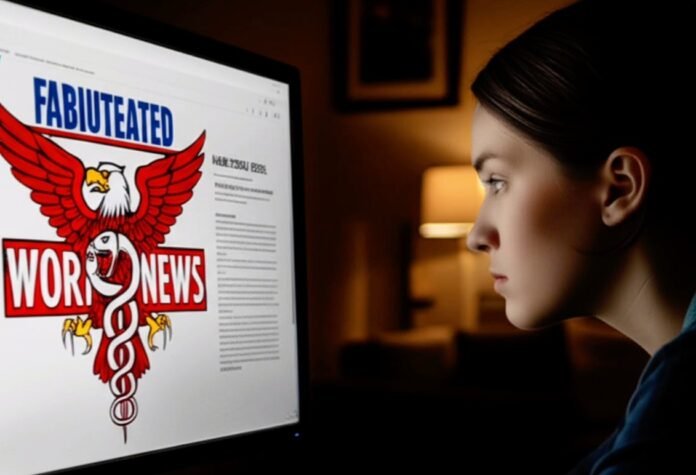In South Africa’s dynamic digital landscape, the pursuit of virality often trumps the pursuit of truth.
News platforms and citizen journalists alike are increasingly driven by engagement metrics—clicks, shares, and retweets—rather than journalistic integrity. This growth-at-all-costs mentality has turned digital media into a breeding ground for misinformation, eroding public trust and threatening social cohesion.
This growth-at-all-costs mentality has turned digital media into a breeding ground for misinformation, eroding public trust and threatening social cohesion.
For online publishers, higher engagement equals greater ad revenue and visibility. For self-proclaimed citizen journalists, sensational or emotionally charged stories—regardless of accuracy—are a shortcut to online influence. Together, they create a clickbait culture where speed and virality matter more than facts.
A perfect storm: When clicks replace credibility
A classic case of fake news propaganda, fuelled by so-called citizen journalists and a gullible audience, recently unfolded when Inside Out News falsely claimed that the SAPS National Intervention Unit (NIU) had raided the home of Dudu Myeni and discovered R18 million in a safe. The story spread rapidly on social media, generating outrage and speculation. But it was entirely false.
“The SAPS has categorically denied any such raid, urging the public and media to practice responsible information sharing. “No raid was undertaken by any of our units, moreso the NIU,” stated Brigadier Athlenda Mathe in an official media statement to NOWinSA, warning against reckless dissemination of fake news.
This incident reflects a broader problem: the unchecked virality of false information, often amplified by individuals acting as journalists without training, oversight, or editorial standards.
The rise of networked journalism
At the heart of this issue is what scholars call networked journalism—a model where professional and amateur reporters alike share and co-create information across digital platforms. In South Africa, the reliance on Twitter by bloggers, activists, NGOs, and even some public officials has blurred the lines between legitimate reporting and social commentary.
According to a recent study published in SAGE Journals, citizen journalists often “weaponise social media” to shape narratives and mediate public debates. The Twittersphere, the study says, invites specific behavior due to the interaction between the platform’s structure and its actors—fueling the spread of polarizing or inaccurate content.
While citizen journalism plays an important role in diversifying media voices, the infusion of non-professional actors into journalism—without adequate checks—has compromised credibility. In the rush to break stories or express opinions, facts are frequently sidelined.
Networked journalism: A double-edged sword
The rise of digitally networked citizen journalism adds a new layer of complexity to South Africa’s fake news problem. On the one hand, it democratizes information sharing and offers alternative perspectives. On the other, it challenges traditional journalistic standards and verification processes.
The impact of this dynamic is not limited to South Africa. During the conflict in Mali, similar patterns emerged. Citizen journalists used Twitter to report on events in real-time—often with limited verification. While this helped raise awareness, it also spread confusion and disinformation, complicating efforts to mediate the conflict and polarizing public sentiment.
Whether in Mali or Mzansi, the network effect of misinformation—where content spreads rapidly and gains legitimacy through sheer volume—poses a clear threat to truth and public safety.
The deception playbook:
- Sensational headlines: Click-grabbing titles that misrepresent or exaggerate the story.
- Emotional exploitation: Content designed to provoke outrage, fear, or euphoria, prompting quick shares.
- Fabricated stories & and misleading visuals: Entirely made-up events or out-of-context images and videos.
- Echo chamber amplification: Unverified information circulated repeatedly within ideological communities, reinforcing false narratives.
Another recent example involved Elon Musk’s false claims about Starlink’s license in South Africa —specifically, the assertion that he was denied approval because he is “not Black.” The misinformation spread rapidly online, far outpacing efforts to correct the narrative.
Why it matters: the South African context
South Africa’s high social media usage, combined with its diverse cultural and political landscape, makes it especially vulnerable to fake news. Misinformation can:
- Exploit social divisions
- Undermine trust in public institutions
- Disrupt public health messaging
- Fuel political instability
Even reputable outlets are not immune. Pressures like tight deadlines, limited budgets, and reduced newsroom capacity can result in reporting errors—further muddying the waters between legitimate and false content.
How to spot fake news: A digital citizen’s toolkit
To protect the truth and strengthen democracy, South Africans must become critical consumers of information. Here’s how:
- Check the source: Is Is it a credible, transparent outlet with a track record?
- Interrogate the headline: Is it exaggerated or misleading? Does the article match the headline?
- Scrutinise the content: Look for grammar issues, lack of sources, and overt emotional language. Even legitimate newsrooms, operating under immense pressure and tight deadlines, can make errors or misinterpret information. If a story feels incomplete or too one-sided, it’s worth a second look. Cross-reference with major, trusted news outlets.
- Verify visuals: Use reverse image search tools to check for manipulation or outdated media.
- Challenge your biases: Be critical of information that perfectly confirms your existing beliefs.
- Pause before sharing: If in doubt, don’t amplify it. Be part of the solution.
Conclusion: South Africa needs media literacy now more than the ever
The fight against fake news is not just a media problem—it’s a societal one. The fusion of click-driven platforms, networked citizen journalism, and low verification thresholds is threatening the foundation of informed discourse in South Africa.
By promoting media literacy, demanding higher standards from all news creators (professional or otherwise), and resisting the temptation to spread unverified information, we can begin to reclaim the truth—before the clickbait trap consumes it entirely.
ALSO READ: NOWinSA voted best brand news platform in South Africa – 2020 MEA Markets

